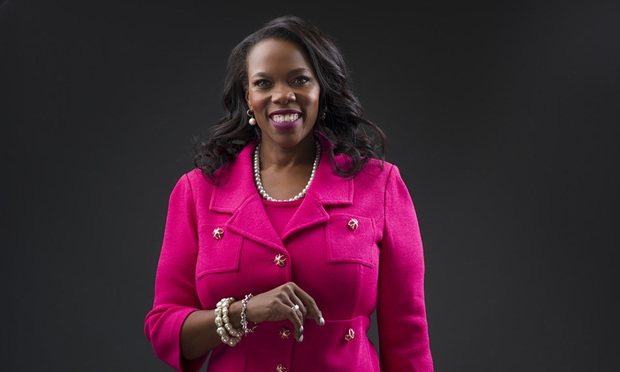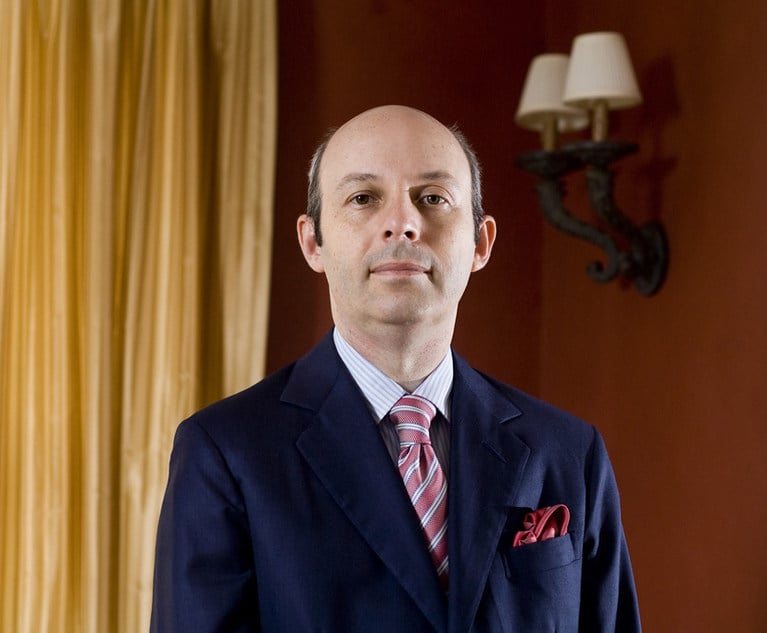Dallas County Voters Love Female African-American Judges. Audrey Moorehead Hopes They Will Love Her Too
Dallas underwent a judicial revolution of sorts 12 years ago when its voters decided to elect Democratic candidates to every one of its district and…
March 01, 2018 at 06:00 AM
5 minute read
 Audrey Moorehead
Audrey Moorehead
Dallas underwent a judicial revolution of sorts 12 years ago when its voters decided to elect Democratic candidates to every one of its district and county-level benches. And since making a clean break with the Republican party in 2006, the electorate in Texas' third-largest city has seemingly fallen in love with a specific kind of Democrat judicial candidate—the African-American woman.
Of the 60 state and county trial courts in Dallas County, 19 of them are presided over by black female judges. And after the March 6 Democratic Primary Election—the only election that matters in the solid-blue county—Dallas' judiciary is poised to become even more diverse as black women are either challengers or unchallenged incumbents in many of the county's 40 judicial elections.
Audrey Moorehead is a criminal defense attorney who is running as a Democrat for an open seat on Dallas County Criminal Court No. 3. She is facing Symone Redwine, who is also African-American, in the primary election for that bench.
Moorehead spoke with Texas Lawyer about her campaign, why Dallas likes black women judges, and whether President Donald Trump's offensive behavior is encouraging women like her to seek public office.
Texas Lawyer: Since Dallas became a solidly Democratic county in 2006, its electorate has favored electing African-American women to its state and county court benches. How did this happen in a city that not long ago had a nearly all-white bench?
Audrey Moorehead: More African-American women have chosen to run since 2006. Many more women, without regard to race, have moved toward breaking the glass ceiling. Women are more involved in decision-making jobs, giving them opportunities that were not present in the past. The city is seeing the benefit of women in high-powered, high-skilled occupations desiring to give back to their community through elective office. Voting is very important in the African-American community and continues to be the cornerstone of the Civil Rights movement. Minority and female candidates also reap the benefit of Dallas County's voting patterns.
TL: What made you decide to run for a county criminal court bench?
Moorehead: I decided, as a college student, to build a career based on community service. I started out in nonprofit at the Visiting Nurse Association in management with Meals on Wheels and began to look for avenues to expand on that commitment. Law school was the perfect path and I became a criminal defense lawyer in 2007. I am a widely recognized legal educator on the national, state and local level with extensive experience practicing in Dallas County criminal courts. I decided to run for County Criminal Court No. 3 because it is the highest and best use of my skills and experience at this time and because I am dedicated to doing my part to improve the criminal justice system.
TL: Dallas County's election ballot is loaded with female and minority candidates. Do you think that's a response to the misogynistic and racist behavior exhibited by President Donald Trump?
Moorehead: I think the ballot is more reflective of the legacy of people such as Barack Obama who demonstrated to people of color that they could obtain votes from all communities. African-American women tend to vote out of responsibility and I believe that their motivation to seek public office is about the issues and not the optics. I am cognizant of the fact that despite success on the local level, women of all ethnic backgrounds still face obstacles at the state and national levels.
TL: With over 40 Dallas benches up for grabs during this election cycle, how do you go about convincing voters you deserve to be a judge when so many other candidates are asking the same thing?
Moorehead: When I made the choice to work in the nonprofit sector, even with an MBA, I understood that this was not the path for those seeking wealth. Public service is not the avenue to get rich. Voters appreciate that one must transcend their personal agenda to seek the greater good for the community. This is not the path for those seeking power but it is the path for those seeking to help the powerless. Ultimately, it's about getting the message out that I have more criminal law experience, more civic leadership experience and that serving in elected leadership for the State Bar of Texas, Texas Criminal Defense Lawyers Association and Dallas Bar Association communicates that I have the trust and support of many people. Dallas County deserves a judge with the experience, reputation and resources that I bring to the table.
TL: Is there anything noticeably different about the justice delivered in Dallas courts now that its judiciary is more diverse?
Moorehead: The most noticeable difference is that Dallas now has a judiciary more reflective of the community it serves. The voters elected a diverse judiciary and by doing so sent a message that Dallas was moving from just tolerance to acceptance. It is undisputed that people have lost trust in our system of justice in both the civil and criminal courts. There are concerns about implicit bias and the indigent poor being victimized by an unfair bail system. The increasingly diverse judiciary communicates that there are people on the bench that are sensitive to these and other issues. Public trust is a principal asset of the justice system and a diverse judiciary goes a long way in strengthening trust and confidence in our judicial system.
This content has been archived. It is available through our partners, LexisNexis® and Bloomberg Law.
To view this content, please continue to their sites.
Not a Lexis Subscriber?
Subscribe Now
Not a Bloomberg Law Subscriber?
Subscribe Now
NOT FOR REPRINT
© 2025 ALM Global, LLC, All Rights Reserved. Request academic re-use from www.copyright.com. All other uses, submit a request to [email protected]. For more information visit Asset & Logo Licensing.
You Might Like
View All
SCOTUSblog Co-Founder Tom Goldstein Misused Law Firm Funds, According to Federal Indictment
2 minute read
Read the Document: DOJ Releases Ex-Special Counsel's Report Explaining Trump Prosecutions
3 minute read

Trending Stories
- 1Munger, Gibson Dunn Billed $63 Million to Snap in 2024
- 2January Petitions Press High Court on Guns, Birth Certificate Sex Classifications
- 3'A Waste of Your Time': Practice Tips From Judges in the Oakland Federal Courthouse
- 4Judge Extends Tom Girardi's Time in Prison Medical Facility to Feb. 20
- 5Supreme Court Denies Trump's Request to Pause Pending Environmental Cases
Who Got The Work
J. Brugh Lower of Gibbons has entered an appearance for industrial equipment supplier Devco Corporation in a pending trademark infringement lawsuit. The suit, accusing the defendant of selling knock-off Graco products, was filed Dec. 18 in New Jersey District Court by Rivkin Radler on behalf of Graco Inc. and Graco Minnesota. The case, assigned to U.S. District Judge Zahid N. Quraishi, is 3:24-cv-11294, Graco Inc. et al v. Devco Corporation.
Who Got The Work
Rebecca Maller-Stein and Kent A. Yalowitz of Arnold & Porter Kaye Scholer have entered their appearances for Hanaco Venture Capital and its executives, Lior Prosor and David Frankel, in a pending securities lawsuit. The action, filed on Dec. 24 in New York Southern District Court by Zell, Aron & Co. on behalf of Goldeneye Advisors, accuses the defendants of negligently and fraudulently managing the plaintiff's $1 million investment. The case, assigned to U.S. District Judge Vernon S. Broderick, is 1:24-cv-09918, Goldeneye Advisors, LLC v. Hanaco Venture Capital, Ltd. et al.
Who Got The Work
Attorneys from A&O Shearman has stepped in as defense counsel for Toronto-Dominion Bank and other defendants in a pending securities class action. The suit, filed Dec. 11 in New York Southern District Court by Bleichmar Fonti & Auld, accuses the defendants of concealing the bank's 'pervasive' deficiencies in regards to its compliance with the Bank Secrecy Act and the quality of its anti-money laundering controls. The case, assigned to U.S. District Judge Arun Subramanian, is 1:24-cv-09445, Gonzalez v. The Toronto-Dominion Bank et al.
Who Got The Work
Crown Castle International, a Pennsylvania company providing shared communications infrastructure, has turned to Luke D. Wolf of Gordon Rees Scully Mansukhani to fend off a pending breach-of-contract lawsuit. The court action, filed Nov. 25 in Michigan Eastern District Court by Hooper Hathaway PC on behalf of The Town Residences LLC, accuses Crown Castle of failing to transfer approximately $30,000 in utility payments from T-Mobile in breach of a roof-top lease and assignment agreement. The case, assigned to U.S. District Judge Susan K. Declercq, is 2:24-cv-13131, The Town Residences LLC v. T-Mobile US, Inc. et al.
Who Got The Work
Wilfred P. Coronato and Daniel M. Schwartz of McCarter & English have stepped in as defense counsel to Electrolux Home Products Inc. in a pending product liability lawsuit. The court action, filed Nov. 26 in New York Eastern District Court by Poulos Lopiccolo PC and Nagel Rice LLP on behalf of David Stern, alleges that the defendant's refrigerators’ drawers and shelving repeatedly break and fall apart within months after purchase. The case, assigned to U.S. District Judge Joan M. Azrack, is 2:24-cv-08204, Stern v. Electrolux Home Products, Inc.
Featured Firms
Law Offices of Gary Martin Hays & Associates, P.C.
(470) 294-1674
Law Offices of Mark E. Salomone
(857) 444-6468
Smith & Hassler
(713) 739-1250






